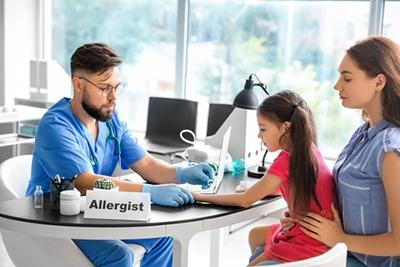
An allergy refers to your immune system's exaggerated response to a substance (i.e., allergen) that is typically harmless. According to Dr. Alan Sheen, an allergist with offices in Covington and Metairie, LA, common allergens include pollen, mold spores, pet dander, insect bites, and dust mites. Certain medications and foods may trigger an allergic reaction or be the cause of child allergies.
Allergy Testing for Kids - What Every Parent Needs To Know
Allergy testing for kids is an important step in the identification and ongoing management of allergic conditions. Allergies can show up in various ways, such as rashes on the skin, respiratory problems, GI issues, and more. Testing for child allergies is a good idea when –
- There is a likely hereditary component or family history.
- Your child experiences recurring or persistent symptoms that may include –
- Hives.
- Coughing.
- Nasal congestion.
- Wheezing.
- Eczema.
- Digestive issues and more.
Note: However, certain medications have the potential to impact allergy testing results, so it is important to let Dr. Sheen know about a child's current medication. For example, the child may need to stop your child taking antihistamines several days before testing.
Types of Allergy Tests
- Skin Prick Test – This test – which can identify common allergens, is generally well-tolerated; a minute amount of allergens is applied to the skin using a tiny needle. It is common for the test site to become red or swollen.
- Blood Test (RAST) - A small blood sample taken from the arm can accurately measure the presence of specific antibodies (IgE) that respond to respiratory or food allergies.
Allergy Tests Results
While a positive result indicates the presence of specific IgE antibodies to a particular allergen, it is noted that a negative result doesn't automatically rule out an allergy, as some reactions may not produce measurable antibodies.
Depending on the outcome, an allergist can help -
- Implement treatment strategies to avoid future events.
- Explore treatment options that may include certain meds or allergy immunotherapy (a.k.a. allergy shots).
Allergies can change over time, so it is important to maintain routine follow-up appointments to monitor the condition and adjust the treatment plan.
Suggestions To Help Manage Allergies in Everyday Life
- Keep prescribed emergency medication (such as an epinephrine auto-injector for severe allergic reactions) nearby.
- Work with your child's school to create an allergy action plan.
Contact a Leading Metairie, LA Allergist Today
Allergy testing is a crucial step in managing child allergies, and early identification of a potential allergen can significantly improve a child's quality of life. For more information, contact Dr. Sheen at (504) 456-1999 (Metairie, LA), (985) 246-6077 (Covington, LA) or online.